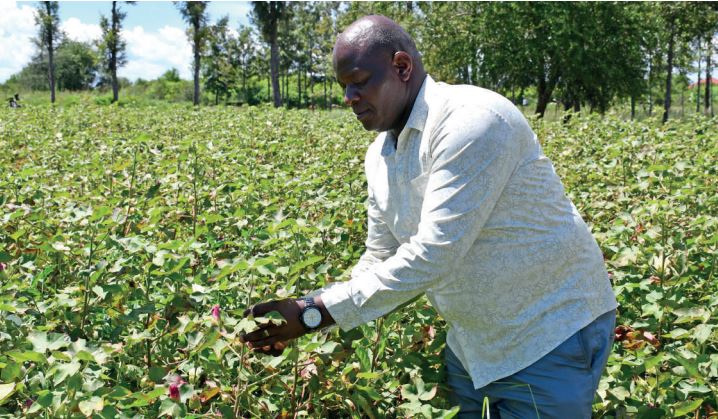

The National Biosafety Authority will host its annual conference in Naivasha in two weeks' time.
The 13th Annual Biosafety Conference will bring together experts to promote public awareness of genetically modified foods and counter misinformation within the sector.
The three-day conference will also serve as a national platform for education on the role of modern biotechnology and biosafety.
It will be held under the theme, "13 Years Later: Building Trust and Ensuring the Safety of Genetically Modified Organisms."
Josphat Muchiri, acting director of Biosafety Research and Compliance at the authority, told media they have been engaging with the public to assure them that regulated technologies, such as GMOs and genomics, are safely deployed.
There has been widespread misinformation, particularly concerning biotechnology products, despite the NBA's 14 years of effort to dispel misconceptions.
"The NBA's mandate is to regulate GMOs. There has been a lot of misinformation and disinformation about GMOs, with members of the public often unaware that the government has established structures to assure their safety," he explained.
Muchiri said the government, through the NBA, ensures that any biotechnology product undergoes thorough scrutiny. Once approved, the public can then consume these products.
Additionally, monitoring can last for a maximum of 20 years after the NBA’s approval of a GMO product.
The agency is responsible for overseeing biosafety activities and issuing approvals for GMOs through various regulations covering aspects such as contained use, environmental release, import/export/transit and labelling.
He cited the successful commercialisation of BT cotton since 2020, which is now cultivated in over 23 counties nationwide.
"We have been able to monitor the performance of BT cotton and have not observed any adverse effects that were not anticipated during our assessment. Farmers who have planted BT cotton are pleased. So far, there is no regret regarding the NBA's decision to approve BT cotton for farmers," he stated.
The approval of BT cotton is a significant achievement, owing to the comprehensive assessment and its availability to farmers, especially considering cotton's historical importance as a major cash crop in many regions of the country.
They have been assessing virus-resistant cassava, which is in advanced stages of variety assessment. Once concluded, these varieties will be made available to farmers.
"We have safety inspectors whom we send to farmers growing BT cotton to ensure the technology is still effective. So far, we have not received any reports from either farmers or our biosafety inspectors regarding any adverse effects of BT cotton. We will continue to monitor BT cotton for the next 15 years, until 2040."
Muchiri also addressed the controversial issue of BT maize trials, especially given its status as a staple crop.
The authority has been involved throughout this process and therefore, guarantees its safety.
The BT maize research and trials, ongoing for over 12 years, have successfully tackled pests such as the stem borer and fall armyworm.
However, the product will not be imposed on farmers.
One of the key pillars ensuring the safety of biotechnology products is post-commercialisation monitoring.
The Authority is guided by two assessment pillars: food safety assessment, under which it ensures that the GMO does not exhibit toxic or allergenic characteristics.
This is by verifying that the compositional and nutritional profile of the food has not been altered by genetic modification.
The second pillar is environmental safety assessment, to ensure the GMO does not harm biodiversity, including non-target insects like bees or other pests.
While GMOs have been in existence for over 30 years, the director cautioned that anyone undertaking GMO research, particularly at university level, must obtain approval from the NBA.
Conducting research without the authorisation would lead to administrative and legal actions against those institutions.
"We have so far registered five institutions. We issued a public notification alerting these institutions that any scientist dealing with GMO research must obtain authorisation from the NBA. We will soon be sending our biosafety inspectors to all our universities to follow up," he said.
The NBA has also decentralised its services across the country, with offices in Busia, Namanga, Taita Taveta, Lunga Lunga and Malaba.
Furthermore, the authority has established a molecular laboratory for GMO testing.
"Initially, before this lab opened in 2022, we used to outsource that service to other labs and the NBA was unable to control the testing being done through outsourcing," Muchiri explained.
The upcoming conference, which is both national and international, will see delegates from all counties participate.
"We want to engage the public, farmers involved in BT cotton cultivation, as well as cassava and maize farmers, to discuss the NBA's journey and partnerships with county governments in areas such as agriculture," Muchiri added.
"We expect scientists and policymakers, including our Members of Parliament, as well as international speakers who will share their experiences in commercialising these technologies in their respective countries."
Joel Ochieng’, programme leader for agricultural biotechnology at the University of Nairobi said the annual biosafety conference offers a crucial opportunity to engage with the public on the research, development and benefits of genetically engineered crops and livestock.
"Our research currently focuses on outcomes that align with climate change and resilience, applying biotechnology to improve food and nutritional security, mitigate the footprints of agricultural practices and climate change and invigorate public education for an enhanced understanding of biotechnology," he told media.
Dr Ochieng, who is also the secretary general for the Kenya University Biotechnology Consortium, said concerns regarding the safety and socioeconomics of the technology will also be addressed during the conference.
"We will discuss how best to manage modern biotechnology products for the benefit of Kenya, especially as many of these products head towards commercialisation.”
Over the past year, they have engaged political leaders, youth, church leaders, doctors, clinical officers, nurses and other healthcare professionals.
The conference provides an additional opportunity to engage the general public and serves as a forum for extended public participation on products of genetic engineering.
“As more products emerge, particularly in the food industry through modern biotechnology, it is essential to focus on public engagement and communication, national dialogue on stewardship, and public confidence and support," the Kubico secretary general said















